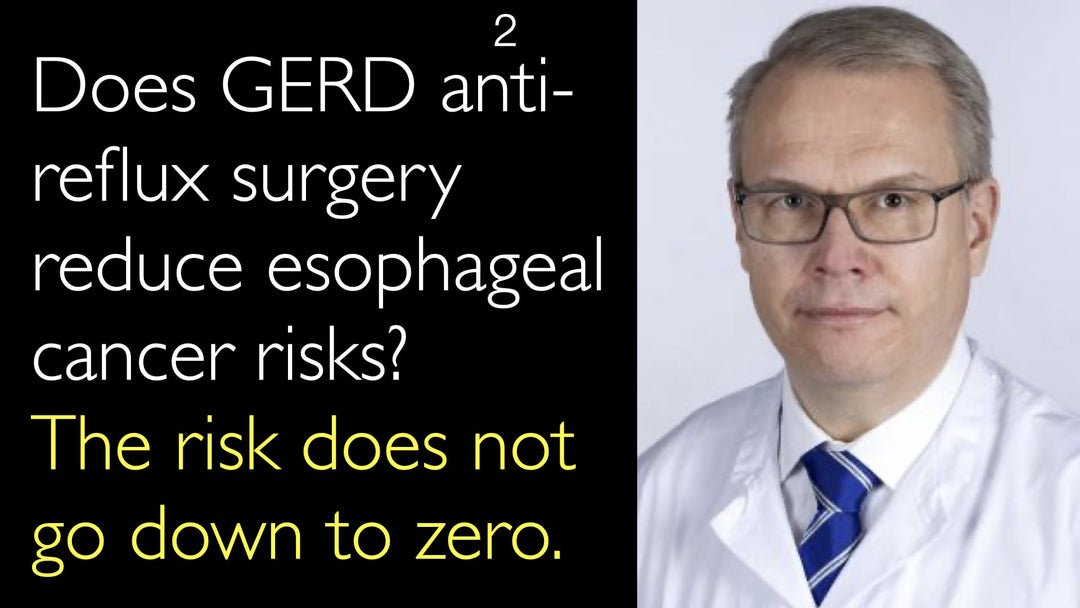食道外科の権威であるJari Rasanen医師(医学博士)は、抗逆流手術が食道癌リスクを低減するものの、完全には排除しない仕組みについて解説します。同医師は、手術後も食道粘膜における酸化ストレスが持続することを示した重要な研究を詳述。Jari Rasanen医師(医学博士)は、持続的な炎症が癌リスクの重要な指標であると強調し、手術が成功した後も、患者には生検を用いた継続的な経過観察が必要であると述べています。
GERD手術と食道がんリスク:患者が知っておくべきこと
セクションへ移動
逆流防止手術とがんリスク
GERDに対する逆流防止手術は、その後の食道がんリスクを完全には取り除きません。Jari Rasanen医師(医学博士)は、この手術がリスクを減らすもののゼロにはならないと説明しています。これは、食道粘膜における病変のプロセスが、長期間の逆流によって既に始まっている可能性があるためです。したがって、手術による保護効果は絶対的なものではありません。
酸化ストレス研究の結果
Jari Rasanen医師(医学博士)は、約15年前に発表された画期的な研究を引用しています。この研究は、重度のGERDに対して逆流防止手術を受けた患者を対象とし、手術前後の食道粘膜における酸化ストレスのレベルを測定しました。その結果、手術後に酸化ストレスが有意に減少したものの、ゼロまでは低下しなかったことが示されました。
この発見は、食道がんのリスクが持続することを示す生物学的な証拠となります。Jari Rasanen医師(医学博士)は、これが患者の理解と長期的なケアにおいて極めて重要であると指摘しています。
症状に対する手術適応
現在、逆流防止手術の主な目的は症状のコントロールです。Jari Rasanen医師(医学博士)は、薬物療法でGERDの症状を十分に管理できない場合に手術が検討されると説明しています。目的は、胃酸の逆流を止めて患者の生活の質を向上させることであり、がん発生を確実に予防する手段ではありません。
Anton Titov医師(医学博士)は、Jari Rasanen医師(医学博士)とこの重要な区別について議論しており、患者はこの手術を完全ながん予防策と考えるべきではないとしています。
持続的な炎症と生検
逆流防止手術後も、持続的な炎症の経過観察が不可欠です。Jari Rasanen医師(医学博士)は、食道粘膜から生検を採取することの重要性を強調しています。手術が成功した後も炎症が残存している場合、それはがんリスクが残っている明確な兆候です。これは手術がリスク低減に効果的でなかったことを意味するわけではありませんが、注意深い経過観察が必要であることを示しています。
定期的な内視鏡検査によるサーベイランスが、この残存リスクの管理に役立ちます。
個別のリスク要因
逆流防止手術後の個々のがんの転帰を予測することは不可能です。Jari Rasanen医師(医学博士)は、リスクの低減は集団全体で見られる統計的な現象であると述べています。個々の患者については、他の要因を評価して個人のリスクを判断する必要があります。中でも食道粘膜の状態が最も重要な評価因子です。
Anton Titov医師(医学博士)とRasanen医師は、これが患者とのコミュニケーションにおいて重要なメッセージであることに同意しており、期待値の管理はGERD治療プロセスの重要な一部であるとしています。
全文書き起こし
Anton Titov医師(医学博士): 逆流防止手術を受けた場合、それはその後の食道がんのリスクを完全に排除しますか?それともリスクを減少させますか?逆流防止手術後の食道がんリスクは、どのような要因に左右されますか?
Jari Rasanen医師(医学博士): 問題は、長期間にわたってGERDによる逆流を経験した後に手術を受ける場合、逆流防止手術の保護効果が完全ではないことです。リスクは減少しますが、食道粘膜で既に始まっているプロセスが進行し、依然として食道がんを引き起こす可能性があります。
約15年前に私たちが発表した研究では、逆流防止手術を受けた患者を調査し、酸化ストレスを調べました。手術後、粘膜の酸化ストレスは有意に減少したものの、ゼロにはならなかったことを証明しました。これは、成功した逆流防止手術後も食道がんのリスクが残存する証拠です。
ただし、現在の逆流防止手術の主な適応は、薬物療法で症状をコントロールできない場合の症状管理です。したがって、手術後にがんが発生しないという保証は患者にできません。
Anton Titov医師(医学博士): これは非常に興味深い点です。逆流防止手術は胃食道逆流症の症状をコントロールするために用いられますが、それでも食道がんのリスクを減少させますか?それとも、統計的に見てがんリスクは変わらないのでしょうか?
Jari Rasanen医師(医学博士): 私たちの研究に基づくと、やや不明確な部分もありますが、食道がんのリスクは減少する傾向にあります。ただし、ゼロにはなりません。したがって、個々の患者が手術後に食道がんを発症するかどうかを断言することは不可能です。
基本的には、他の要因、特に粘膜の炎症を評価する必要があります。食道粘膜から生検を採取して炎症の有無を調べます。手術後も炎症が残存している場合、それは依然として食道がんのリスクがあることを示唆しています。
これは逆流防止手術がリスクを減少させないという意味ではありませんが、リスクをゼロにはしないということです。これは胃食道逆流症の患者にとって重要なポイントです。




